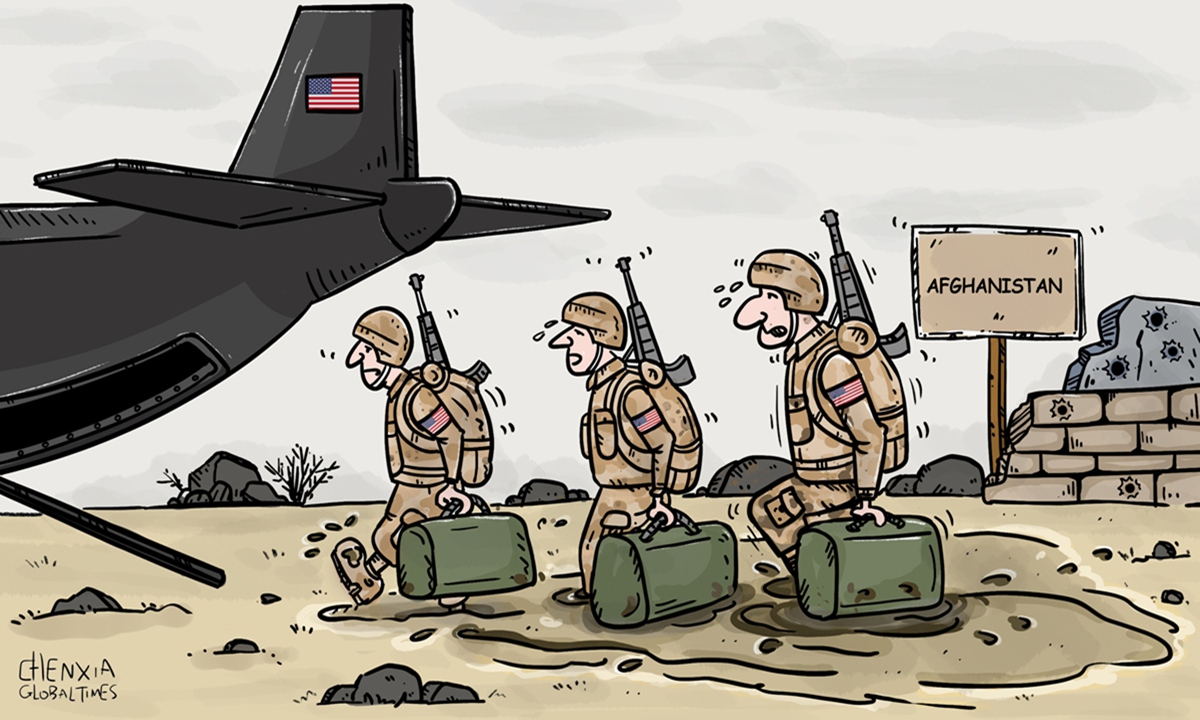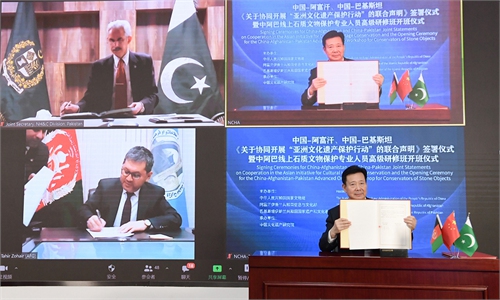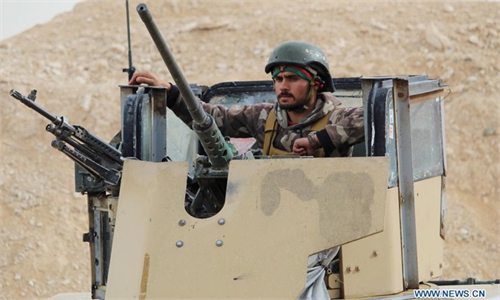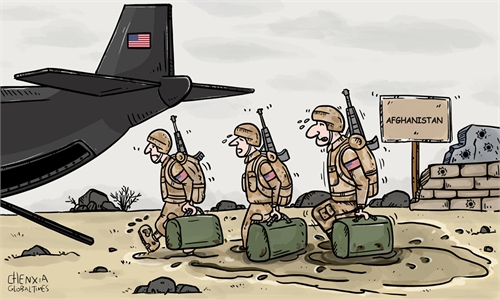
Illustration: Chen Xia/GT
In April, Afghan President Mohammad Ashraf Ghani wrote an article in Foreign Affairs magazine, and gave an interview to Der Spiegel to articulate his vision and framework for the peace process of Afghanistan. It is a critical time that we all come together and work for it, since the risk is too high for everyone - especially the region.
US President Joe Biden announced the withdrawal of the remaining 2,500 American troops from Afghanistan by September this year. It might be a shock for some, but not for us. We, as a sovereign country, respect that decision and will do all we can to make it smoother. President Ghani stated, "I view this as a moment of both opportunity and risk for itself, for the Afghans, for the Taliban and for the region. For me as the elected leader of the Islamic Republic of Afghanistan, it is another opportunity to reiterate and further my commitment to peace".
In the meantime, the region is worried about the chaos or even another civil war in Afghanistan. Two weeks ago, Foreign Minister Wang Yi, in a press conference with five FMs of Central Asian countries, expressed his concern and demanded that the United States that the withdrawal should happen in a responsible manner.
Obviously, the announcement of the withdrawal is not the end of the world for us. We see it as a start of a new phase in our international relations. Let me remind you that it is not the first withdrawal. In 2014, around 130,000 US and NATO troops withdrew from Afghanistan allowing the Afghan security forces, trained by them, to take full responsibility.
Afghan National Defense and Special Forces (ANDSF) bravely took the responsibility and defended the motherland. During this time, Afghanistan was able to conduct two major elections nation-wide. President Ghani claimed that "today, our government and security forces are on a much stronger footing that we were seven years ago, and we are fully prepared to continue serving and defending our people and after American troops depart".
Looking at it from another perspective, the withdrawal will give real sovereignty of decision making to Afghan army leaders. Certainly, from now on, all the decisions regarding the fight with terrorist groups will be made by the Afghan government. On the other hand, it will destroy the Taliban's justification for war and jihad against a foreign power. We believe the withdrawal decision surprised the Taliban more than anyone else.
Now it is time for the Taliban to answer critical questions about their vision for Afghanistan. Will they accept elections, and will they uphold the right of women and minorities? We haven't had a positive response from them so far. To avoid these questions, they even left the peace table in Doha and pulled off from a peace conference in Istanbul.
Ordinary Afghan's perspective is very clear - we will not repeat the horrors of the 1990s. They affirmed the end state of Peace in a Loya Jirga (Grand Assembly) in August 2020. The government of Afghanistan articulated its vision very clearly, stating that we want a sovereign, Islamic, democratic, united, neutral and connected Afghanistan. This vision is supported by all the international and regional partners. The United Nations resolution states it clearly and all of the regional countries have stated it many times that they want to see a united and democratic Afghanistan. This has been communicated by these countries to Taliban during their private visits as well.
We all know that even in an ideal environment keeping peace agreements is a difficult task. Unfortunately, we are not close to an ideal environment. There are many risks and obstacles that could derail this process and we could lose a precious opportunity for peace. We have to brace ourselves for a bumpy road and will step on it patiently to reach a lasting peace.
First and foremost, is the transition and withdrawal of troops. It is the responsibility of the international society to do it in a responsible way, and it is our government's responsibility to facilitate the process. In that line, it is absolutely necessary for the US and NATO to fulfill their existing commitments to fund the ANDSF. Second, a simple obstacle is the uncertainty mostly created by the media. This could incline Afghans to leave their country and would repeat the refugee crisis of 2015. We have to be careful and not magnify the negative aspects of the withdrawal.
We believe the region now faces a most crucial important element. In that line, China has a major role to play. The US may play a minor role in the peace process from now onwards. The real deal should happen with Pakistan. In that sense, China is best suited to build confidence between Pakistan and Afghanistan. There were efforts made in the past, but now is the time to really focus on this matter. In addition, China can help the Afghan government and people with trade opportunities. The current trade volume between the two countries is minimal. China is a massive market and Afghanistan is a good producer of natural fruits. The trade could easily go higher with a little political and technical considerations. This would help the poor layer of the society and would lessen the financial burden on the government. In a way, this would prevent a potential chaos.
Helping Afghanistan's national government is also in China's favor. The Afghan Government fought and will continue fight terrorism in any form. Terrorist activities are one of the major security concerns for China. To respond to that concern, the best way is to help the national government.
We believe another main challenge to peace is Taliban miscalculation. The Taliban still believe in their own narrative that they defeated US and NATO. They feel emboldened, and the Taliban will continue to show no earnest interest in making a political deal and will instead opt for a continued military aggression.
In case that happens, ANDSFs are ready to respond. In the past two years, over 90 percent of the military operations have been conducted by Afghan forces. Should the Taliban choose violence, it would mean a major confrontation over the spring and summer months. At the end, the Taliban would be left with no good options except to come back to the negotiating table. However, many lives might have been lost.
The author is Afghan Ambassador to China. opinion@globaltimes.com.cn



